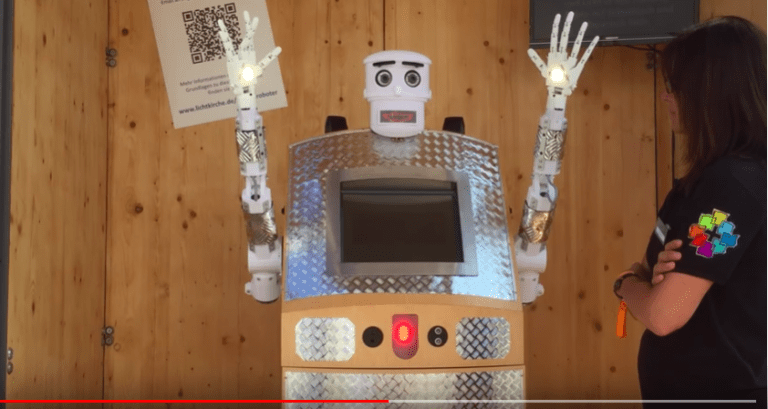We have automated lots of jobs and human tasks. Could we automate the pastoral ministry? As people put their faith in technology–to the point of hailing post-singularity Artificial Intelligence as a god–it is little wonder that the idea has arisen of robot priests and robot pastors.
Augustana philosophy professor David O’Hara has written an article at OneZero entitled How Robot Priests Will Change Human Spirituality.
Already, he says, a robot in Japan has been programmed to do the chanting at Buddhist funerals. A German church is using a robot to give blessings.* In the Islamic nation of Dubai, a machine uses Artificial Intelligence to pronounce fatwas. “Other groups,” O’Hara says, “have experimented with machines that can hear confessions, offer prayers, or even offer sacraments.”
O’Hara then contemplates the possibilities of Robot Priests.
Ursula Le Guin once wrote that “a machine is more blameless, more sinless even than any animal. It has no intentions whatsoever but our own.”. . .
Maybe we could use machines that do the best things clergy do for us. A machine that resembles a human could chat all night with a lonely person, and might make a very good counselor. It could offer comforting words at the bedside of someone who suffers from dementia, or who needs a listening ear. It could read stories or sing songs. Why not automate the singing of hymns, the reciting of scripture, the chanting of prayer, the pronouncement of blessings? All of those things are desirable, at least to some people.
He concludes, though, that there are some things Robot clergy could not and should not do. “A machine can repeat ritualized ‘hatch, match, and dispatch’ words for us, but can it share our experience as an empathetic companion? And if it can’t, does that diminish the meaning of the ritual?”
He also sees dangers, and offers a terrific quotation with many applications:
Paul Virilio puts a finer point on this: “When you invent the ship, you also invent the shipwreck; when you invent the plane you also invent the plane crash; and when you invent electricity, you invent electrocution… Every technology carries its own negativity, which is invented at the same time as technical progress.”
Whether we believe in gods or not, our technologies can begin to function like gods, or like the priests that tell us how to behave. Even if we don’t intend them to, our machines can become our oracles, and where there are oracles, there are people ready to profit from those oracles.
But there is a deeper issue at stake. Though the talk about robot ministers is only theoretical at this point, the misconception it demonstrates about the office of the holy ministry is real. This robotic view of ministry has done great damage to the relationship between congregations and their pastors and to the church as a whole.
This is the functional view of the ministry. What defines a pastor is the actions that he carries out: preaching, counseling, praying, presiding at services, dispensing the sacraments. Theoretically, a robot might carry out these functions, though whether that would be appropriate depends on how effective it would be in doing so. (How good are the robot’s sermons? Is it increasing church attendance? Maybe it would fall short in the empathy department, so we might still need a human being for counseling.)
But even in the current absence of robot clergy, the technology being not quite ready for that, many pastors today are assessed in exactly the same way!
Being a pastor is not just fulfilling functions. It is a vocation from God. A man is called by God to be a pastor. And then the church ordains him. Thereafter, God works through that pastor as he carries out the duties of his office.
The pastor operates, in the words of the traditional absolution liturgy, “by virtue of my office, as a called and ordained servant of the Word. . . .” A newer version says, “As a called and ordained servant of Christ, and by His authority. . . .” (Lutheran Service Book, Divine Service settings three and one).
God brings the forgiveness of sins through the pastor; God proclaims His word through the pastor’s preaching and teaching; Christ performs the sacraments that the pastor enacts in His name; the Holy Spirit cares for us through acts of pastoral care.
The question is not whether or not a robot can be programmed to preach, pray, and preside at services. The questions are, can a robot be called? Can a robot be ordained?
These give rise to other questions: Does God call robots to be pastors? If you think that He might, what would be the Scriptural basis for that belief? Has the church ever ordained robots? What would be the theological basis for doing so?
The answers would indicate that, no, there can be no such thing as robot pastors. Your smart phone can play back a recorded sermon, but that doesn’t make the smart phone your pastor.
Discussions of robot ministers should ask the related questions: Can there be a congregation consisting only of machines? Could churches increase their membership by filling their pews with laptop computers, smart phones, and electronic appliances? What if they all could be programmed to repeat the responses and play the assigned music? If the functions of people in the congregation would be replicated–such as saying words to God and listening receptively–would that be worship? If those machines, as Ursula LeGuin says, cannot sin, how can they repent, be evangelized, and grow in sanctification? Why would they need to go to church?
If you are worried about Artificial Intelligence actually developing to the point of being human-like or God-like, put your mind at rest by reading these posts:
*I looked up that German robot pastor, and it is even worse than I imagined. The blessed-spouting robot is called BlessU-2. It was installed by the Lutheran state church of Hesse and Nassau at Wittenberg! In honor of the anniversary of the Reformation!
Here is a YouTube video, showing the worshipper using a touch screen on the robot’s chest to choose her blessing, including whether she wants it in a male or female voice! Whereupon the robot pastor intones the blessing and lifts up his hands, which emit a beam of light! Then you can print out your blessing! Note the expressive eye-brow, programmed, I assume, to express empathy. You have got to watch this video, which will make you laugh and cry at the very same time:
Illustration: YouTube screen shot














